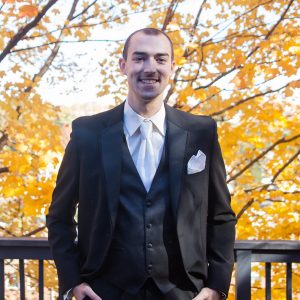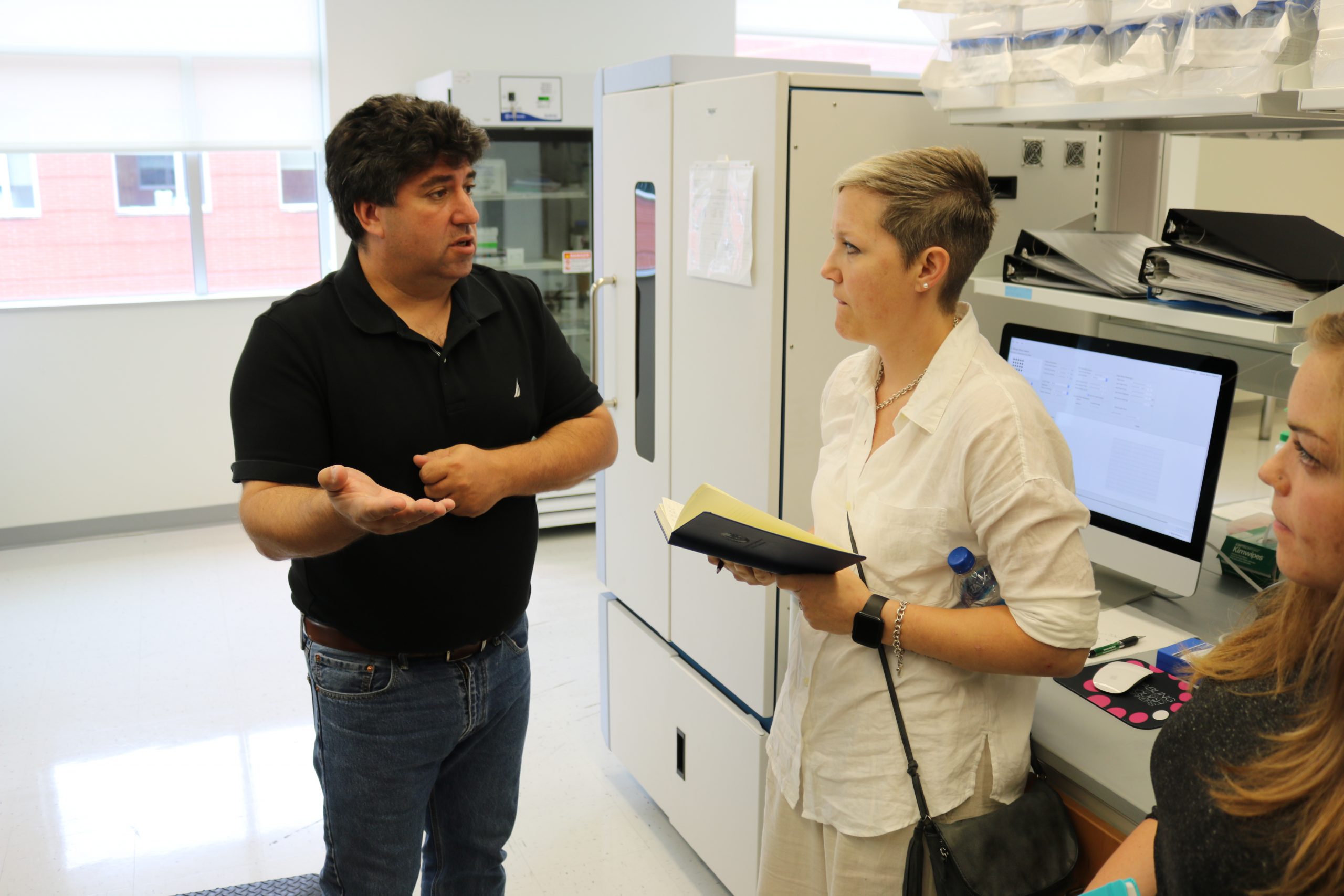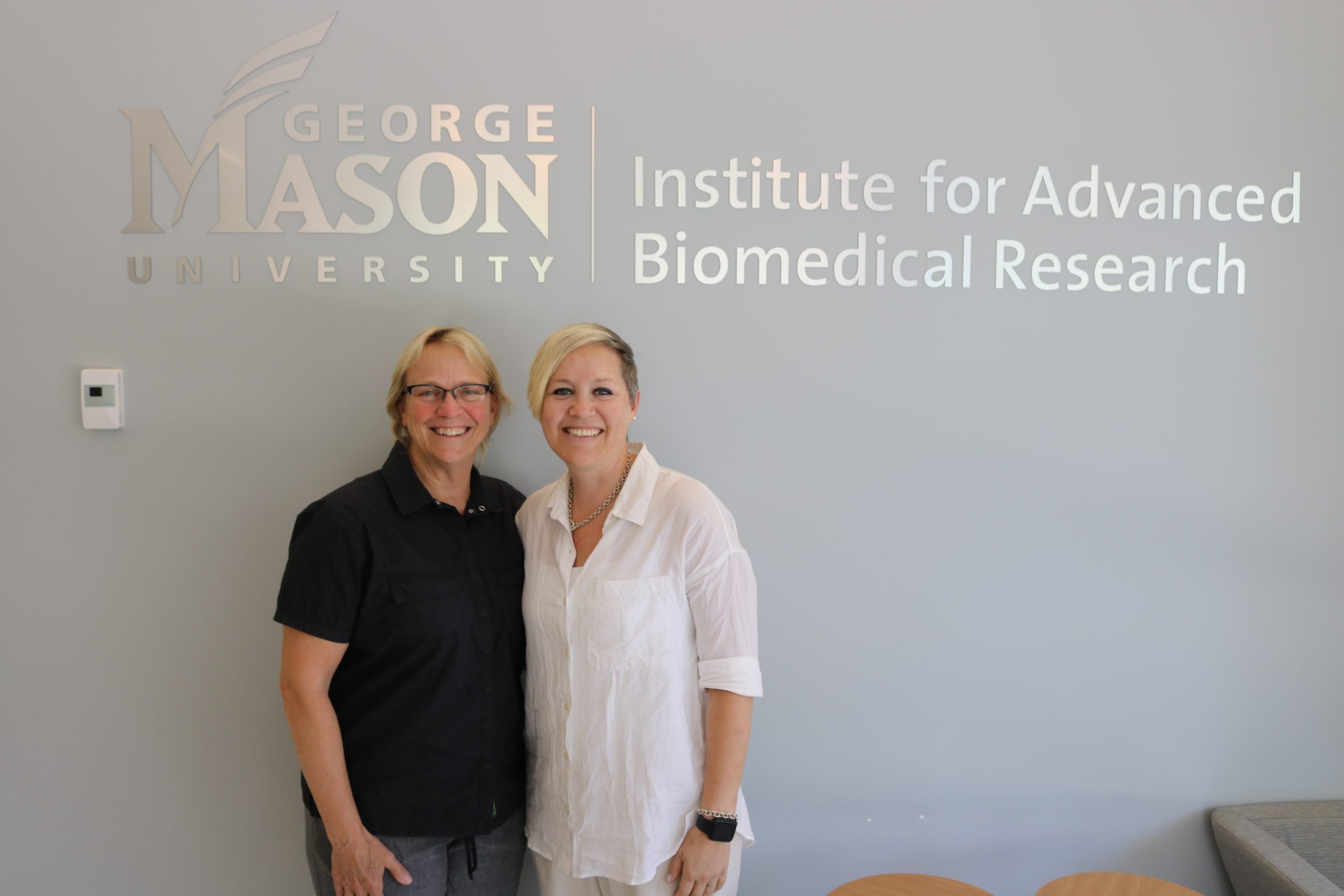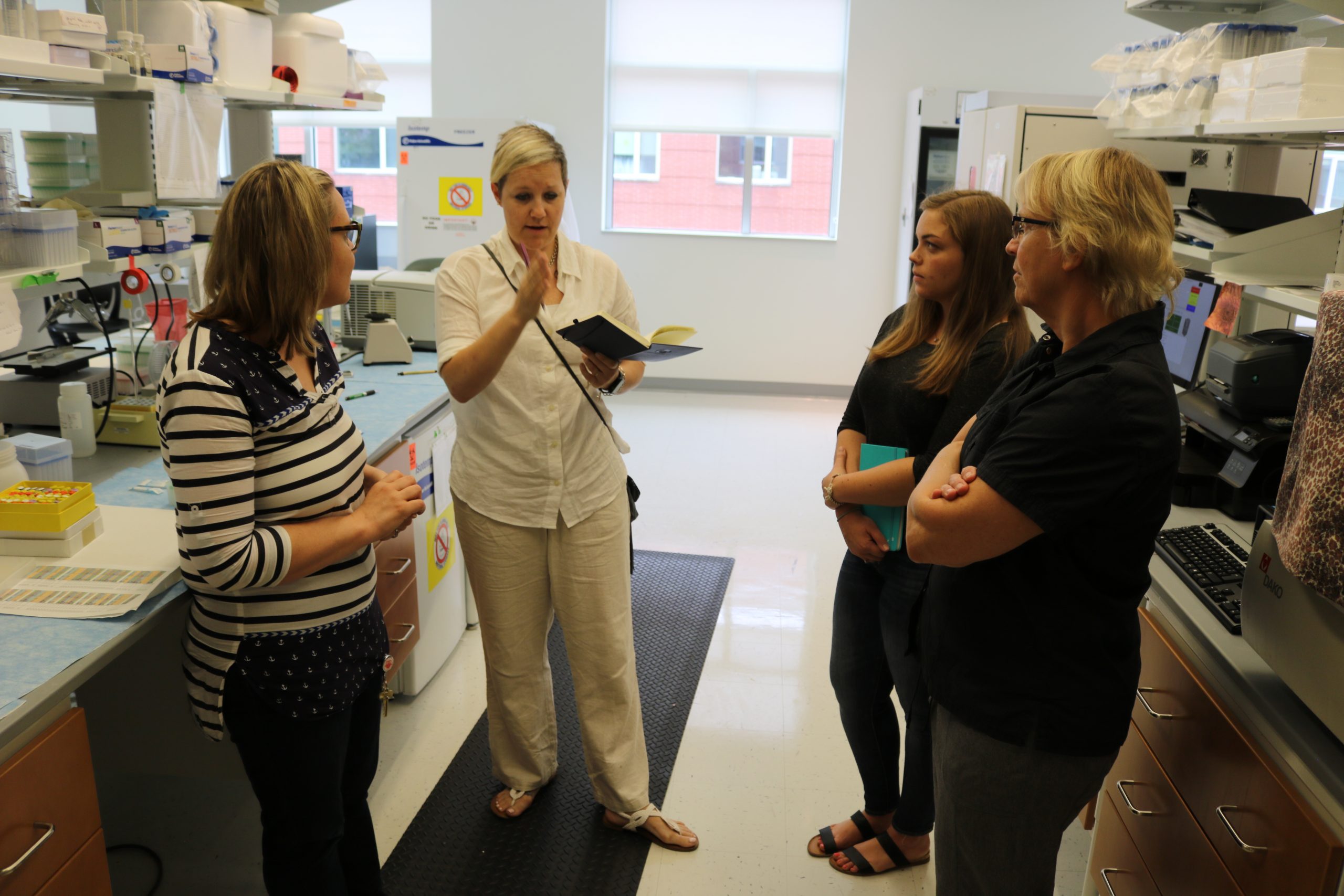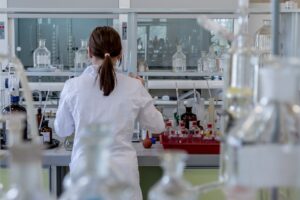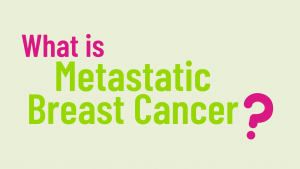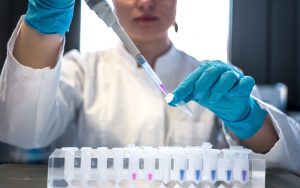Clear Falls (TX) head coach and breast cancer survivor Lyndsay Hodges visited our research facility at George Mason to learn about our cutting-edge stage IV breast cancer research. After meeting with our research team, including Chip Petricoin and Mariaelena Pierobon, we sat down with her to talk about her visit.
What were your thoughts going to our research center and talking to Chip?
Not knowing what I was walking into, it was nice for everyone giving me the background on who Chip was and about his family’s connection to volleyball. He is super sciencey and at first, I wondered if I was even going to understand the words that were coming out of his mouth. Fortunately, the information that was discussed was not over-complicated. There was so much information, but I understood it.
He obviously used terms I am familiar with now. I wouldn’t have been familiar with them three years or before today, so that helped me understand a little bit better. Getting to hear every stage of what ya’ll are doing and everything that ya’ll have accomplished, it seems so much more than what you can see when you click on The Side-Out Foundation website.
Actually understanding what he was saying and knowing that there have been achievements and big findings that have happened and are still happening was the coolest thing.
Were there any statistics that really stuck out to you?
He said that when stage IV patients are diagnosed and they have that first stage of therapy, 30-40% of the women really respond. The 30% are responding, another 40% or so are kind of responding and then that other 30% aren’t responding. The researchers are looking at that 30% and 40% and saying, “okay, what isn’t responding?”. They have seen a huge growth with a 30% upswing in progression-free. 30% doesn’t sound like a lot, but knowing statistics and cancer, that is a huge number.
There are so many women that are looking for a little bit more time. It’s not always about the cancer going away. It’s about how much more time I’m going to get with my family. Being able to find that progression-free stage for another year and then another year and then another year, that’s the groundbreaking part. That’s the difference maker.
Do you feel proud of what volleyball has been able to accomplish with this research?
Yeah! It always makes me proud when I get to say that my girls did something on our campus. I get to say this research is because of what the volleyball team did. I always question if I am being braggy or just proud? I’m like, no I’m being proud because my team did it! The volleyball team helped do this, we were in the neighborhoods. That was us! It’s not being braggy. It’s being proud of the fact that your group stepped up and did something.
I think in the ten years of existence of Dig Pink, the volleyball community, whether they vaguely understand what is happening or they know what is really going on, has grabbed on and said yeah we’re gonna do it! We’re on board. Just sign us up, let us know what we have to do and we’ll run with it. Some coaches say “we’ll figure it out later what we’re really doing”, and some coaches say “I know what we’re doing”. Let’s keep going!
Everyone I know that has done it in the past or they are doing it now, they get excited. It’s something that they can relate to. Their kids and their families know that this is because of volleyball. I am proud that volleyball can put this research in its cabinet and say this is what we’re doing for cancer.
What would be your advice to coaches who may not understand our mission and who hesitate to participate in something with The Side-Out Foundation?
Not so much to challenge them, but to ask them what their thoughts are about it. What are their hesitations or what other entities are they looking at or considering? Then ask them, what do you know about them? If you are questioning what this group does, make sure you are being that discerning with every other group you interested in helping. I can finally answer these questions for you. You can get those same questions answered.
I feel like it’s one of these things that sometimes you have to know who to ask. You have to know where to look. If you are more comfortable with one sport or another, you are going to go visit their website and you are going to click on everything to find the answers. If you are a little more unfamiliar or something is new, you aren’t as willing to explore, but you should find a way to investigate. You should know that someone like Side-Out actually has relevance on so many more levels than just a random group because we are volleyball.
We are also part of breast cancer research by joining Side-Out. There are 1-in-8 women that have breast cancer in general and then the statistics keep changing for stage IV and every other diagnosis. You should know if you are willing to do the work and research one foundation, give the same effort to another and understand what your fundraising efforts are doing.
Being from Texas what would be your advice to Texas teams/coaches/organizers who may not necessarily think Dig Pink would directly impact them or their state?
What is your biggest take away from today?
Seeing this research, it truly is groundbreaking and changing the way cancer is treated. I wrote it in all caps in my notebook. You see it on the website and I have heard Rick and Janice say it. Before today, I didn’t get it. Now I can see the research is changing the way breast cancer is being treated because of how they are treating it.
Mariaelena said “discovery” at the end of our visit. This phase three is about discovery. We’re finding the markers and we’re finding what is actually going to work on those markers and it doesn’t have to be drugs that we’ve used for just breast cancer. It can be any cancer. What is it about the cancer that can be stopped, can be changed, can be altered? That’s what everybody is trying to find. That is every cancer too. It’s not just breast cancer.
I saw it first hand. We looked at the specific strands that had similarities to others. The research then tells us that even though a drug has never been used before for that person, the biomarkers can show that an FDA approved drug could be used. I didn’t know that and didn’t understand that was what they were doing in all of their phases. I thought it was just, “We are testing things out and seeing what happens. We are going to see if this one works instead of this one. She’s had seven other therapies and we are going to try number eight and see if that works”. There’s more to it!
Just not having that understanding of necessarily what a real trial does, but now knowing that in this trial it’s discovering things that work versus just something new that was a huge “AH-HA” moment. That is bigger than anything else because like Rick said, it’s a trickle-down effect. If they can find something that works for this cancer, then it helps everybody else. It helps every other breast cancer patient, every other lung cancer patient. It could even help every other colon cancer patient. If you can find something at the molecular level that has the ability to change everything… wow, that could be huge.
Do you have any final thoughts?
I’m just blown away. I did not expect the information that is already out there. The database that’s been created. The work that has already been done on understanding markers and the machinery that we saw in the lab. Just how they are getting so specific to the cancer cell. Seeing what is done to find help and to find the answers needed to get to the bottom of such a cruel disease.
It is so much more than I imagined. Oddly, I’ll say the advantage of having breast cancer is I understand the language better. You just don’t know what you are going to get on any side of it, but hearing things that I could understand and make sense of answered questions that I still had about my own diagnosis. For me, it’s gone for now, but you never know if it will come back or how it will come back. It is incredible to me how they identify it, see the markers and know what can attack it. That is incredible to me and that is something that I didn’t even understand and couldn’t have possibly understood without seeing what I saw today in the labs.
I wish everybody could get that opportunity because it changes your whole perspective.
* To learn more about Side-Out’s stage IV breast cancer research, please visit HERE. *
